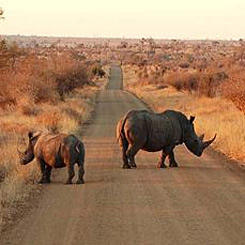
Environment and Biodiversity
Place
Limpopo National Park, Mozambique
Sponsor
Alexandre Maillot
Grant(s)
€4,000 (2011 Student Solidarity Prize) to the Selection Committee at 2011/06/28
Project leader
Istom Student Environmental Expertise (ISEE)
Created in 2001 on over a million hectares, the Limpopo National Park accommodates an exceptional biodiversity and is a major resource for over 100,000 people. The civil war years and overexploitation of forestry resources by the local population, to meet their food (fruits), energy (heating), and material (construction) needs, have jeopardized the permanence of this protected area.
Since 2006, Agence Française de Développement (AFD) has been backing a program in support of the communities living in the Park to fight poverty and to reinforce food security, while conserving the biodiversity. The program, set up by the Park staff, features a variety of projects, including the creation of two nurseries in the "buffer" zone: the borderland between the central zone of the Park, where all human activities are banned, and the peripheral zone where the local populations live.
A founding project for a nonprofit of community interest
The nonprofit Istom Student Environmental Expertise (ISEE) has been providing its expertise to the AFD and to the Limpopo National Park to create a pilot nursery in one of the villages of the "buffer" zone, picked for the motivation and involvement of its inhabitants.
The project is one aspect of the studies of the agronomical engineering students of Istom, an international schoolbased in Cergy-Pontoise, enabling them to intensify their theoretical knowledge in the field. It is the founding project of the ISEE, created in 2010 to make the skills and expertise of its members available for projects of community interest. The members have all had previous experience in an international development project.
A pilot project to spur developments in agrarian systems
The project is broken down into seven steps spread over half a year, including nine weeks in the field, ranging from data gathering to a review with the Park's managers and the AFD, and including an environmental survey, plus an inquiry among the population, and training the villagers in setting up the nursery. Three Mozambican students from the agronomic university of Maputo, trainees in the Park, joined the group of French students during the preliminary study, thereby allowing an exchange between universities sharing the same speciality. The inquiry among the villagers and the resource staff (including the technical manager of the program) is aimed to identify the species exploited by the populations, and their uses, in order to understand the social organization of the villages and thereby determine the ideal mode for managing the nursery. "Popularizers", villagers who will then manage the nursery, are trained and participate in setting up the project. Back in France, the students follow up the progress of the project and draft recommendations and a complete review for the Park administration and the AFD.
Setting up a pilot nursery is an indispensable step in the evolution of agrarian systems toward a forestry agriculture system. The latter combines biodiversity conservation (reforestation, preservation of soil fertility, reduced exploitation of the Park's resources) with the socioeconomic development of the population (creation of income producing activities, better access to resources).
The jury of the Student Solidarity Prize was particularly impressed by the relevance of the project which, over and above economic development and biodiversity conservation, integrates the local populations, from upstream (preliminary studies) to downstream (management and follow-up).
Alexandre Maillot, the sponsor, Veolia Water area manager in Ile de France, counseled the students in the preparation of the file and tracks the progress of the project.

